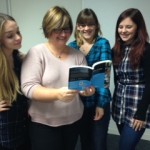 Student midwives spend approximately 50% of their three year undergraduate programme in the clinical area. Going to a new placement is often a stressful time for them as they consider ‘will they fit in’, ‘will they know enough’, ‘have they the right skills’, ‘what will they be able to learn whilst there to meet their practice assessments’ and so on. Other concerns relate to being away from home, what hours they are expected to do and how they cope with ‘difficult’ mentors. If students are unfamiliar with healthcare environments it takes time for them to adjust and become used to the environment. It was these thoughts that began fermenting in my head back in 2010 and following a positive response from students whose views on a book on placements were informally sought, I pitched the idea to a commissioning editor at Wiley Blackwell. In addition wider research had revealed that no such book existed within the published midwifery arena. Finally, in 2012 a contract was agreed between myself, and Margaret Fisher, Associate Professor in Midwifery at Plymouth University to co-edit nine chapters for submission in November 2014. The book is now due for publication on the 11th December 2015.
Student midwives spend approximately 50% of their three year undergraduate programme in the clinical area. Going to a new placement is often a stressful time for them as they consider ‘will they fit in’, ‘will they know enough’, ‘have they the right skills’, ‘what will they be able to learn whilst there to meet their practice assessments’ and so on. Other concerns relate to being away from home, what hours they are expected to do and how they cope with ‘difficult’ mentors. If students are unfamiliar with healthcare environments it takes time for them to adjust and become used to the environment. It was these thoughts that began fermenting in my head back in 2010 and following a positive response from students whose views on a book on placements were informally sought, I pitched the idea to a commissioning editor at Wiley Blackwell. In addition wider research had revealed that no such book existed within the published midwifery arena. Finally, in 2012 a contract was agreed between myself, and Margaret Fisher, Associate Professor in Midwifery at Plymouth University to co-edit nine chapters for submission in November 2014. The book is now due for publication on the 11th December 2015.
Professor Paul Lewis wrote the forward and chapter contributions from Bournemouth University lecturers, Dr. Sue Way, Stella Rawnson and myself, prepare prospective and current students for midwifery practice and the profession, caseloading and the elective period. Jo Coggins and Henrietta Otley, both midwives practising in North Wiltshire were co-opted to write chapters on ‘Preparing for practice’ and ‘Low-risk midwifery placements’. Other chapters were written by Margaret Fisher and Faye Doris at Plymouth University.
The final published edition is small enough to fit into a uniform pocket and contains many vignettes from students currently or previously studying at Bournemouth and Plymouth University. Their stories reflect ‘real life’ clinical experience and ‘Top Tips’ provide overall advice. Three original cartoons illustrating the vagaries of placement were devised by Clare Shirley (formerly a BU student, now a newly qualified midwife) and Hugo Beaumont (4th year medical student at Plymouth University). Students and women have provided photographs. Both Margaret and I hope students far and wide will enjoy the book which aims to provide a realistic perspective on clinical placement, by offering hints and tips and encouragement along their student journey.
Category / Knowledge Exchange
Cyber Security Innovation Vouchers – Round 14

Up to £5k funding for start-up, micro, small and medium-sized enterprises to work with an external expert to gain the knowledge to innovate and grow. This voucher is only for cyber security advice including advice leading to certification under the Cyber Essentials Scheme.
For more information click here.
Closing 5 January 2016 – 12pm Noon.
Contact a member of the funding development team if you have any questions .
Why not get involved in the British Science Festival 2016?
The call for event proposals and Award Lecture nominations for the British Science Festival 2016 are now open.
The British Science Festival is Europe’s longest-standing national event which connects people with scientists, engineers, technologists and social scientists. Tens of thousands of people come together to celebrate the latest developments in science and to engage in open discussion about issues that affect our culture and society.
Each September the British Science Festival transforms a different UK city into a vibrant celebration of science, engineering and technology.
The British Science Festival will be returning to Swansea University from 6-9 September 2016. The Festival is a national platform to showcase cutting-edge science, celebrate the latest scientific developments and engage in open discussion about issues that affect our culture and society.
The British Science Association needs your help to curate a vibrant programme of events. Proposals should be aimed at non-specialist adults with a broad interest in science. Find out how to submit an event and nominate an Award Lecture on the British Science Festival website here: http://www.britishscienceassociation.org/british-science-festival
Specifically, they are looking for original, high quality science entertainments events for a wide range of audiences, including families, children, young adults, special interest groups and followers of the arts.
- Previous kinds of events have included:
- Workshops for adults and for families.
- Comedy, drama and musical shows.
- Sci-art collaborations
- Trips to places of interest in the local area
- Behind the scenes tours
- Science shows
Anyone can propose an event – individuals, researchers, organisations or academic institutions from all over the UK. Events can be talks, debates or discussions for a public audience.
The call for proposals will close on 25 March 2016 and the deadline for Award Lecture nominations is 4 March 2016.
If you have any questions or want to discuss your ideas, please contact:
Rosie Waldron (Engagement Manager, British Science Association) T: +44 (0)20 7019 4941 E: rosie.waldron@britishscienceassociation.org
China – UK Research and Innovation Bridges Competition
Innovate UK, RCUK and the Ministry of Science and Technology (MoST) for the People’s Republic of China are to invest up to £16 million in collaborative research and development projects that propose new commercial solutions to critical cha llenges impacting the socio-economic growth and development of China in relation to energy, healthcare, urbanisation and agri-food.The UK investment has been made possible through the Department for Business, Innovation and Skills-managed Newton Fund.
llenges impacting the socio-economic growth and development of China in relation to energy, healthcare, urbanisation and agri-food.The UK investment has been made possible through the Department for Business, Innovation and Skills-managed Newton Fund.
The aim of the competition is to bring together companies (small to medium-sized companies and/or larger businesses), research organisations, academics and other collaborators from China and the UK for the joint research and development of new solutions to key socio-economic challenges, in the form of innovative products, processes or services. The principal market a project must consider is China. Projects must be collaborative, involving both UK and Chinese participants, with both a UK lead partner and a Chinese lead partner. On the UK side, projects can be led by either a business or a research organisation. The lead partner should be able to demonstrate a clear route to commercialisation of the proposed product(s) or service(s), and should have a primary focus on the translation of research and/or knowledge.
Ethnographies of West Howe: student research projects and community collaboration
Over the past few weeks, students on BA Sociology and Anthropology (Faculty of Health and Social Sciences at BU) have been carrying out ethnographic studies in West Howe, Bournemouth. As part of a focus on expanding undergraduate opportunities to conduct first hand research, students have designed their research projects collaboratively with local groups and organisations based in West Howe.
A short drive from Talbot campus, West Howe comprises a large post-war council estate, and faces a number of contemporary challenges in terms of employment, education, health and well being. It is also a green, spacious and welcoming community, with many active local initiatives aiming to improve quality of life for people in the area. Some aspects of its pre-World War Two history as a rural farming community remain present in its contemporary physical environment, combining with the modernist 1950s vision of suburban public space expressed in the architecture and street design. Local people’s experiences of the transition of the area from a largely rural hamlet to a modern housing estate, involving rapid population increase and large scale construction, was captured beautifully in two oral history books published in the 1980s – West Howe Proper and West Howe Too!
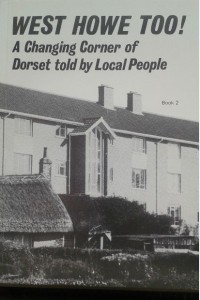 From an early point in their research projects, BU students invested time in building relationships with people in West Howe, working collaboratively with local schools, churches, children’s centres and volunteer groups to identify their key research questions, think through issues of research ethics, and use appropriate methods to gather relevant data, including participant observation, interviews, surveys and focus groups. Many student projects were inspired by the activities of local organisations, residents and volunteers, and the possibilities of engaged ethnography to produce findings that are locally useful and make a difference to people’s lives.
From an early point in their research projects, BU students invested time in building relationships with people in West Howe, working collaboratively with local schools, churches, children’s centres and volunteer groups to identify their key research questions, think through issues of research ethics, and use appropriate methods to gather relevant data, including participant observation, interviews, surveys and focus groups. Many student projects were inspired by the activities of local organisations, residents and volunteers, and the possibilities of engaged ethnography to produce findings that are locally useful and make a difference to people’s lives.
Next Thursday 3rd December students will be presenting their research findings to the community and inviting their engagement, comment and discussion. Themes of the research projects include: primary school education, children’s play and recreation, access to employment, perceptions of addiction, wellbeing and social support, social mobility and transport. Interested BU colleagues are also welcome to attend – please email Dr Rosie Read know if you plan to come (email: rread@bournemouth.ac.uk).
Event details:
Thursday 3rd December, 10am-1pm. Fernhealth Play, Verney Road, Bournemouth BH11 8DA.
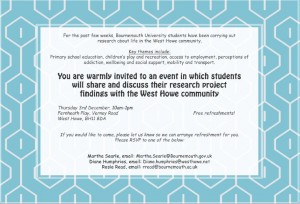
‘Vulnerable Warriors: Counter-terrorism and the rise of Militarised Policing’ seminar by Dr Anna Feigenbaum and Daniel Weissman,
Dr Anna Feigenbaum
Daniel Weissman
2nd December 2015, Royal London House, R303, 1-1:50 pm
All staff and students welcome to the last Social Science seminar in 2015.
Abstract:
This paper seeks to better understand the cultural and material processes of police militarization and its relationship to security infrastructures and geo-political practices of social control. In this paper we trace the rise the ‘Warrior Cop’ through an analysis of changes in the circulation of advertisements of policing and policing products at security expose between the late 1990s and the present, taking our analysis up through the recent Paris attacks and the Milipol Security expo held days after.
This analysis is framed against the backdrop of existing research on the shift in the post-Cold War period from a security focus on the threat of the nation-state to the threat of insurgency and non-state actors. This period was characterized by national and transnational changes to policing: intelligence gathering and information sharing, as well as equipment supply and transfer and knowledge exchange around training and operations.
We begin this paper with an overview of the key shifts in the military and policing sectors that gave rise to the phenomenon of ‘Warrior Cops’. In contrast to dominant narratives of police militarisation that see power and tactics shift directly from the military to the police, we outline what we refer to as the militarization of security, a process through which not only the police, but also judicial and emergency response services, infrastructures, feelings and attitudes become transformed in ways that position the need for warriors against the threat of risky spaces and vulnerable bodies.
For any enquiries regarding the Social Science seminar series please contact Dr Mastoureh Fathi: mfathi@bournemouth.ac.uk
Institute of Global Health Innovation – Student Challenges Competition 2015

The vision at Institute of Global Health Innovation (IGHI) is to support the identification, development and widespread diffusion of healthcare innovation and in doing so to sustainably reduce global health inequalities across the globe.
The Student Challenges Competition offers students a key opportunity to showcase their research idea and to win prize money of up to £5,000 to develop this further. Runners-up prizes will also be awarded.
This year, it is also compulsory for all applications to be accompanied by a 2-3 minute promotional video illustrating the project idea and how it works.
As part of the Audience Choice Award, £500 is up for grabs to shortlisted candidates for those who produce the best video. The winners will be announced at the Dragon’s Den event with the rest of the prizes.
The competition is open to all UG & PG students based in the UK and can be on any aspect of global health innovation.
Jaeyeon Choe PhD, recent book chapters.
Jaeyeon Choe PhD, a new member of the Department of Events & Leisure has just published book chapters that you might be interested in using for teaching or research. Please contact Jaeyeon at jchoe@bournemouth.ac.uk for a PDF copy of each chapter for research and/or teaching purposes.
“Developing Student Engagement in China through Collaborative Action Research” in Tourism Education: Global Trends and Issues (2015) Amazon Book link
“China’s Tourism’s March Forward: Towards a Green Transition or Unsustainable Tourism” in Tourism in the Green Economy (2015) Amazon Book link
“Religious Tourism Experiences in South East Asia” in Religious Tourism and Pilgrimage Management: An International Perspective (2015) Amazon Book link
Thank you! 🙂
Creating Impact: BU Partner of 1st German CSR Communication Congress
More than 200 communication and corporate social responsibility (CSR) professionals attended the 1st German CSR Communication Congress last week in Osnabrueck. Due to management academic Dr Tim Breitbarth’s involvement in initiating, organising and moderating this successful event, BU was recognised as one of its academic partners.
This first congress was based on a collaboration between the German Public Relations Association (DPRG), the European Business Ethics Network Germany (DNWE) and the German Federal Environmental Foundation (DBU). Dr Breitbarth is a founding member of the CSR working group within the DPRG.
Welcoming speeches (e.g. from a representative from the German Federal Ministry of Labour and Social Affairs), the keynote (from the editor-in-chief of a well-known business magazine), the panel discussion (e.g. with the director corporate sustainability of Tchibo and a board member of Transparency International Germany) and special workshops of the 1.5-day congress revolved around the rising relevance of internal and external CSR communication – e.g. in the context of increasing pressure to report on CSR; the need for constructive stakeholder dialogue; and in order to manifest internal support for sustainability strategies. Dr Breitbarth moderated the workshop on social media and online communication.
Mainly, attendees came from large firms like Aldi, Audi and German Telecom; internationally successful SMEs; leading sustainability and communication agencies; and influential civil society organisations. Reviews of the congress are widely available in respective German media. Feedback from participants very much suggests that the event built-up specific knowledge, provided inspiration to solve individual challenges and helped to create valuable business contacts. The second congress will be held in 2017.
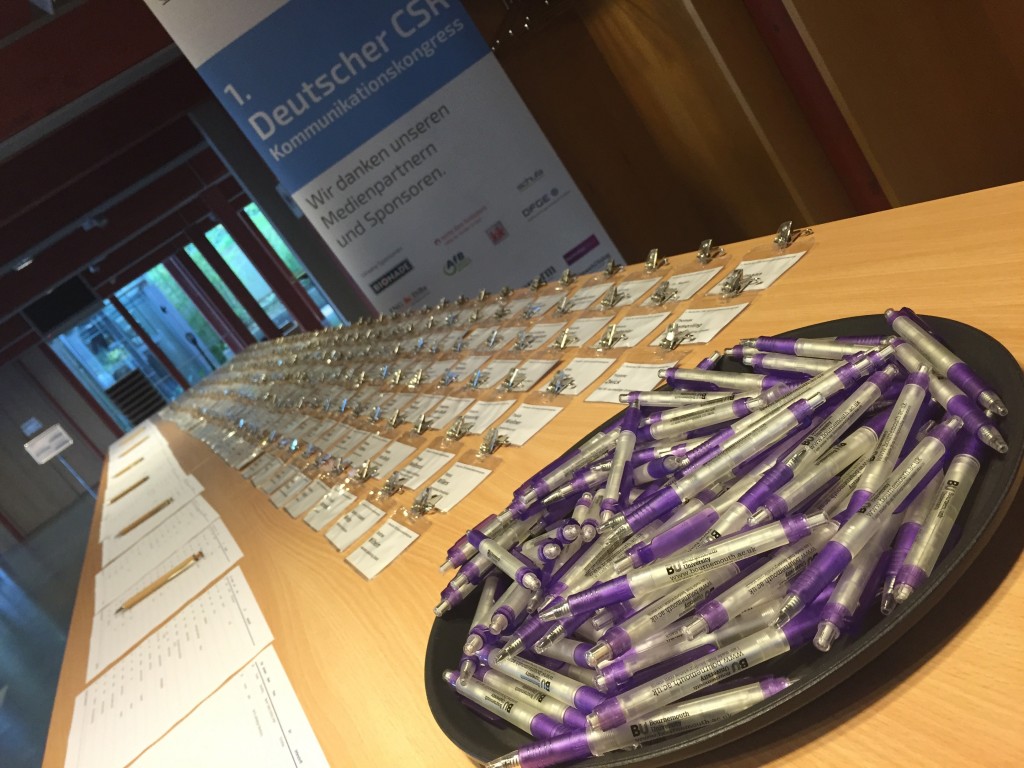
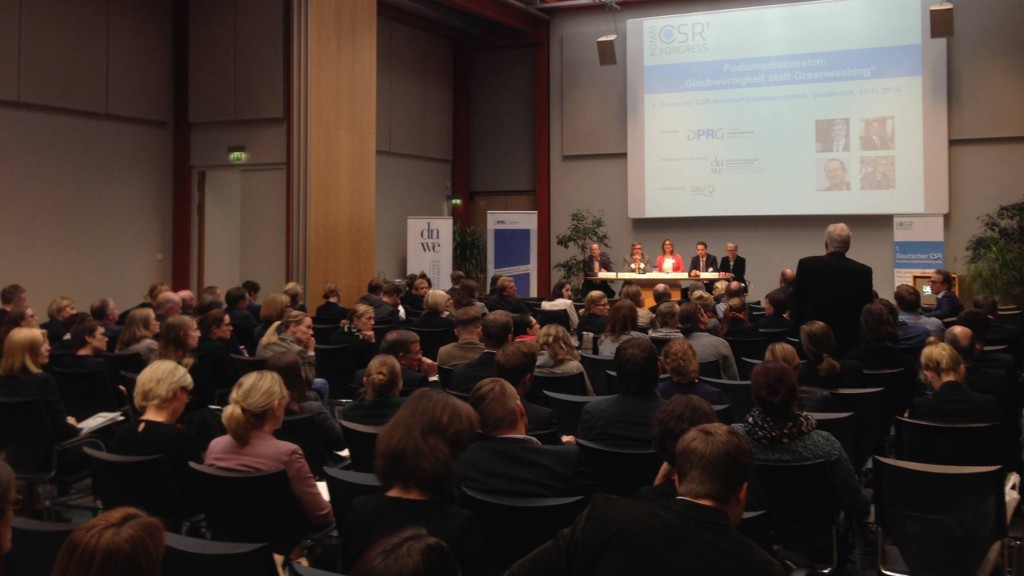
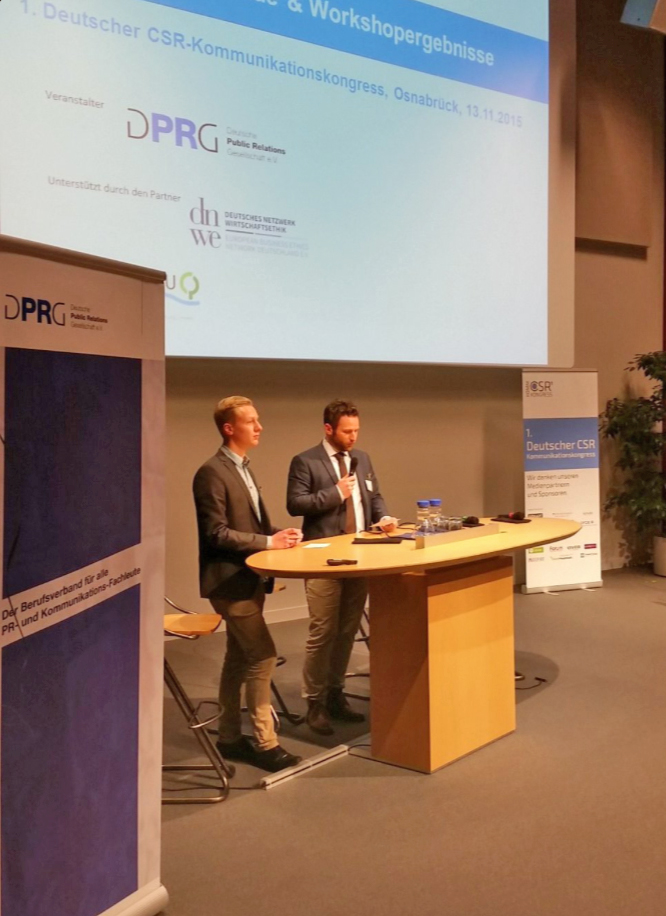
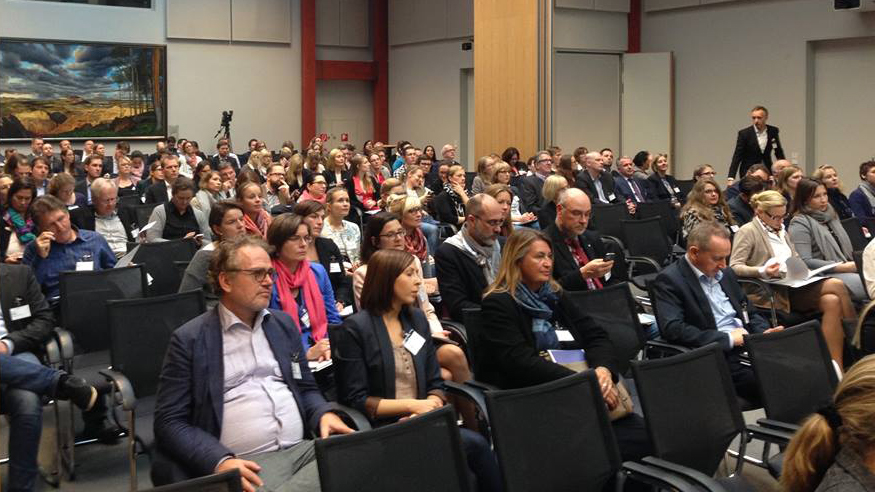
Research from the Department of Psychology in the New Scientist
Research resulting from a BU-funded PhD studentship is featured in this week’s edition of the New Scientist, and was also recently covered by the Independent. Under the supervision of Dr Sarah Bate from the Department of Psychology (Faculty of Science and Technology), Anna Bobak has spent the last three years investigating so-called “super recognisers”, or people with extraordinary face recognition skills. It appears that only a small proportion of the general population have these skills, yet they may be incredibly useful in forensic and security tasks, such as the identification of perpetrators from CCTV footage or in passport control. While super-recognisers have previously been identified via laboratory tests of face recognition, Anna’s work demonstrates that only some of these individuals also excel at more applied face recognition tasks. In a recent paper published in Applied Cognitive Psychology, she demonstrates that more real-world tasks are required to identify the super recognisers who can truly be of value to the Police Force and in national security settings.
Anna has recently moved into a PDRA position where she continues to work with Sarah in the field of super recognition. Her post is part of a HEIF5+1 initiative that aims to generate knowledge exchange with the Police. The team are currently working directly with Dorset Police to create screening tools that can identify officers who may be particularly suited to certain face recognition tasks, and to make a series of recommendations for best practice that are extracted from excellent performance. They are also creating resources that educate officers about the limitations and biases that act upon the human face recognition system, and how these may influence core policing activities.
Successful ESRC Festival of Social Sciences in EBC today

 This afternoon Prof. Jonathan Parker introduced the final of three session in the Executive Business Centre under the title ‘Enhancing social life through global social research: Part 3. Social science research in diverse communities’. This session was well attended and coveredwas a wide-range of interesting social science research topics.
This afternoon Prof. Jonathan Parker introduced the final of three session in the Executive Business Centre under the title ‘Enhancing social life through global social research: Part 3. Social science research in diverse communities’. This session was well attended and coveredwas a wide-range of interesting social science research topics.
Professor of Sociology Ann Brooks started off the session with her presentation on ‘Emotional labour and social change.’ She was followed by Prof. Edwin van Teijlingen who gave an overview of research in Nepal. FHSS PhD student Andy Harding introduced his thesis research into ‘Information provision and housing choices for older people.’ At this point Prof. Brooks gave her second talk on ‘Risk and the crisis of authenticity in cities’. Social Anthropologist Dr. Stephanie Schwandner-Sievers spoke about her research on ‘Reconciliation and engaged ethnography in the Balkans.’ Dr. Hyun-Joo Lim highlighted her study on ‘North Korean defectors in the UK’ and the session was completed by Dr. Mastoureh Fathi who presented her analysis of parenting books for Muslim parents in the UK.

This was the last day of the ESRC Festival of Social Science at which Bournemouth University was extremely well presented!
Thank you to my colleagues for organising this and the ESRC for funding the events!
Prof. Edwin van Teijlingen
(medical sociologist)
November Café Scientific joint venture between FHSS & FMC
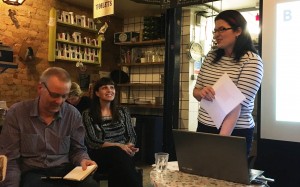 This month’s Café Scientific last week (Nov. 3rd) was run as a collaboration between CMMPH and the Media School. Café Scientific is a monthly event hosted at Café Boscanova for Bournemouth University.
This month’s Café Scientific last week (Nov. 3rd) was run as a collaboration between CMMPH and the Media School. Café Scientific is a monthly event hosted at Café Boscanova for Bournemouth University.
This month’s debate was chaired by CMMPH’s Prof. Vanora Hundley (sitting in the centre of the photo taken by Naomi Kay). The debaters on either side were Dr. Ann Luce and Prof. Edwin van Teijlingen. Ann Luce is a well recognised media researcher and a Senior Lecturer in Journalism and Communication who argued against the motion “Fear in childbirth: is the media responsible?” Two opposing presentations generated a lively debate. The audience, however, was not with Ann and overwhelmingly voted in favour of the motion.
 The next session of Café Scientific also has a health flavour as James Gavin will be talking on Tuesday December 1st on: Upwardly mobile: Why stair climbing helps us stay active.
The next session of Café Scientific also has a health flavour as James Gavin will be talking on Tuesday December 1st on: Upwardly mobile: Why stair climbing helps us stay active.
Prof. Edwin van Teijlingen
CMMPH
Hello from an up and coming researcher, Dr. Choe :)
Hello BU Researchers:
This is Jaeyeon Choe, your new colleague originally from Gangnam, South Korea. After earning my Ph.D. at The Pennsylvania State University, USA, and working in China and Macau, I have joined BU as a Senior Lecturer in Events & Leisure, Faculty of Management. My primary research areas are Spiritual/Religious Tourism, and Chinese Consumer Behavior. Recently, I presented the papers, “Tourism development and its impact on Filipino workers’ quality of life in Macao, China” at Ethnicity and Tourism conference in Chiang Mai, Thailand; and “Chinese consumer behavior: conspicuous consumption at an international wine festival in Dalian, China” at Consumer Behavior in Tourism Symposium in Bruneck, Italy.
I am also currently finishing up a funded study, ‘Tourism development and cross-cultural understanding of quality of life among local residents, skilled and unskilled immigrant workers in Macao, China’ that was granted by Institute for Tourism Studies, Macao. I am preparing for another project on spiritual tourism among westerners in South East Asia, utilising an affiliation with the Centre for Asian Tourism Research at Chiang Mai University, Thailand. It is planned for the summer of 2016, which I am really looking forward to it.
My publications are available on BRIAN. I look forward to many interesting research activities and collaboration across BU! 🙂
https//twitter.com/choe_jaeyeon
KTP Academic Development Scheme – Applications Live
Staff are now invited to apply for a place at the Knowledge Transfer Partnerships Academic Development Scheme (KTPADS).
What is KTP?
A KTP is part-funded by the government and the aim of this scheme is to encourage collaboration on projects between businesses and academics. KTP had previously been called the Teaching Company Scheme (TCS), though a rebrand a decade ago saw the TCS become KTP. KTP is managed by Innovate UK and provides benefits to all parties involved – this scheme offers a fusion of academic and industry collaboration supported by an associate (graduate).
What is to benefit to me?
KTP is an excellent way of bringing in income and developing knowledge exchange with a clear pathway to impact.
Key benefits of KTP are as follows:
- Facilitates research impact
- Increases research funding, including supervision time for the Knowledge Base Supervisor (academic) to the Associate (graduate), this time averages at half a day a week
- Contributes to the University’s REF submission
- Improve links with industry partners
- Apply knowledge to innovative business-critical project
- Raise your profile among colleagues/the Institution
How do I apply?
To apply for a place on the scheme, please compete this application form and send to Rachel Clarke before the application deadline on Sunday 22nd November. This form will need to be signed by yourself and your Line Manager. Applications open on Monday 9th November and close at midnight on Sunday 22nd November.
If you would like to discuss this scheme, please contact Rachel Clarke, Knowledge Exchange Adviser (KTP) on 01202 961347 or clarker@bournemouth.ac.uk

Ten BU papers on academic writing
Last night I received an email from an academic based in South Africa who asked me if I could facilitate a two-day writing workshop in an other sub-Saharan African country later this month. He had found a copy of our paper ‘Writing an academic paper for publication’ on the web.[1] This is, of course, a good advert for Open Access Publishing. I had the pleasure of being able to tell my African colleague that most of our published papers on various aspects of academic writing are Open Access.[1-10] Hence most are freely available to scholars like him in low-income countries. 
Unfortunately, this particular request was for a workshop later this month, which is far too short notice. Especially since my co-author and BU Visiting Faculty Prof. Padam Simkhada (Liverpool John Moores University) and I will be running a one-day writing workshop in Liverpool the day before the proposed dates of the African workshop.
Professor Edwin van Teijlingen
CMMPH
References
- van Teijlingen, E., Hundley, V. (2002) Getting your paper to the right journal: a case study of an academic paper, Journal of Advanced Nursing 37(6): 506-511.
- van Teijlingen, E. (2004), Why I can’t get any academic writing done, Medical Sociology News 30 (3): 62-63. http://www.britsoc.co.uk/media/26334/MSN_Nov_2004.pdf
- Simkhada, P., van Teijlingen E., Hundley, V., Simkhada, B.D. (2013) Writing an Abstract for a Scientific Conference, Kathmandu University Medical Journal 11(3): 262-265. http://www.kumj.com.np/issue/43/262-265.pdf
- Pitchforth, E., Porter, M., van Teijlingen, E.R., Forrest Keenan, K. (2005) Writing up and presenting qualitative research in family planning and reproductive health care, Journal of Family Planning & Reproductive Health Care 31 (2): 132-135. http://jfprhc.bmj.com/content/31/2/132.full.pdf+html
- van Teijlingen, E., P.P., Simkhada, B., Ireland, J. (2012) The long & winding road to publication, Nepal Journal Epidemiology 2(4): 213-215 http://nepjol.info/index.php/NJE/article/view/7093/6388
- Simkhada, P., van Teijlingen, E., Hundley, V. (2013) Writing an academic paper for publication, Health Renaissance 11(1): 1-5. healthrenaissance.org.np/uploads/Pp_1_5_Guest_Editorial.pdf
- Hundley, V., van Teijlingen, E., Simkhada, P. (2013) Academic authorship: who, why and in what order? Health Renaissance 11(2): 98-101. http://www.nepjol.info/index.php/HREN/article/view/8214/6679
- van Teijlingen, E., Hundley, V., Bick, D. (2014) Who should be an author on your academic paper? Midwifery 30: 385-386. healthrenaissance.org.np/uploads/Download/vol-11-2/Page_99_101_Editorial.pdf
- van Teijlingen, E., Ireland, J., Hundley, V., Simkhada, P., Sathian, B. (2014) Finding the right title for your article: Advice for academic authors, Nepal Journal of Epidemiology 4(1): 344-347. http://www.nepjol.info/index.php/NJE/article/view/10138/8265
- Hall, J., Hundley, V., van Teijlingen, E. (2015) The journal editor: friend or foe? Women & Birth 28(2): e26-e29.
KTP Academic Development Scheme
The next cohort for the KTP Academic Development Scheme (KTPADS) will go live for applications on 9th November.
The aim of this scheme is to equip you with the necessary skills and knowledge needed to engage with business and work towards a collaborative project with a business. The end result aims to see the business using Bournemouth University as a knowledge base for a KTP. The scheme will be made up of a series of workshops on business engagement and networking opportunities with local business, it will also include regular support from the Innovate UK regional KTP Adviser and the Knowledge Exchange Adviser (KTP).
Should you be interested in this scheme or require further information, please contact KE Adviser (KTP), Rachel Clarke on 01202 961347 or email KTP@bournemouth.ac.uk

Reports highlight economic impact of business innovation funding

Independent reports on Knowledge Transfer Partnership (KTP) and Smart highlight significant impacts from these Innovate UK funding programmes.
If business enagement is an area you are keen to develop – why not attend the sesion being run on this topic as part of the BRAD training later this month. You will get a chance to hear from internal and external speakers who have worked and are working with BU.
KTP
KTP is managed by Innovate UK and aims to help businesses improve competitiveness and productivity through a partnership with a university or research institution and the employment of a recent graduate with relevant experience – known as the associate. For every £1 invested by KTP sponsors has returned £7 to £8.50 to the UK economy

Smart
The second study by SQW Ltd, working with Cambridge Econometrics and BMG Research, found that Smart funding since 2011 had had a positive impact on business R&D, expenditure, employment, turnover and propensity to export.Smart provides funding of up to £250,000 to support small and medium-sized businesses working on innovative R&D projects that could lead to new products or services. Businesses that responded to the authors’ survey forecast a return by 2017 of £5 for every £1 invested in Smart funding in 2011 to 2012 and 2012 to 2013. The report added that the true extent of the impact of Smart funding since 2011 was not likely to be seen until 2017

New HEIF project commences: Modelling Natural Capital in Dorset
UK government policies relating to economic growth and the environment explicitly identify the need to create ‘a green economy, in which economic growth and the health of our natural resources sustain each other, and markets, businesses and Government better reflect the value of nature’ (Defra 2011). Local Enterprise Partnerships (LEPs) and Local Nature Partnerships (LNP), including those in Dorset, were specifically created to support achievement of this goal. Key challenges are the need to assess the economic value of ecosystem services and to factor them into decision making; and the need to develop integrated and multisectoral approaches to spatial development that improve synergies and reduce trade-offs, while supporting the sustainable management of natural resources.
This project is designed to overcome these challenges, through the development of a modelling toolkit that will enable the value of ecosystem services to be assessed and mapped, then linked with economic activity. While analysis of ecosystem services is now a major international research endeavour, linkage with economic activity (such as the inputs and outputs of different industrial sectors) is at a very early stage. The toolkit to be developed by this project will therefore be both innovative and timely. By piloting the toolkit using Dorset as a case study, this project will deliver a proof of concept, with potential global applicability if successful.
Funded under the Higher Education Innovation Funding (HEIF) initiative, any questions regarding the project can be addressed to P.I. Prof. Adrian Newton or Research Assistant Arjan Gosal.
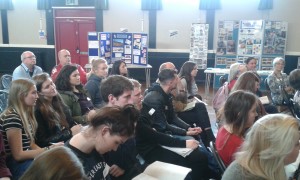











 New CMWH paper on maternity care
New CMWH paper on maternity care From Sustainable Research to Sustainable Research Lives: Reflections from the SPROUT Network Event
From Sustainable Research to Sustainable Research Lives: Reflections from the SPROUT Network Event REF Code of Practice consultation is open!
REF Code of Practice consultation is open! ECR Funding Open Call: Research Culture & Community Grant – Apply now
ECR Funding Open Call: Research Culture & Community Grant – Apply now ECR Funding Open Call: Research Culture & Community Grant – Application Deadline Friday 12 December
ECR Funding Open Call: Research Culture & Community Grant – Application Deadline Friday 12 December MSCA Postdoctoral Fellowships 2025 Call
MSCA Postdoctoral Fellowships 2025 Call ERC Advanced Grant 2025 Webinar
ERC Advanced Grant 2025 Webinar Update on UKRO services
Update on UKRO services European research project exploring use of ‘virtual twins’ to better manage metabolic associated fatty liver disease
European research project exploring use of ‘virtual twins’ to better manage metabolic associated fatty liver disease